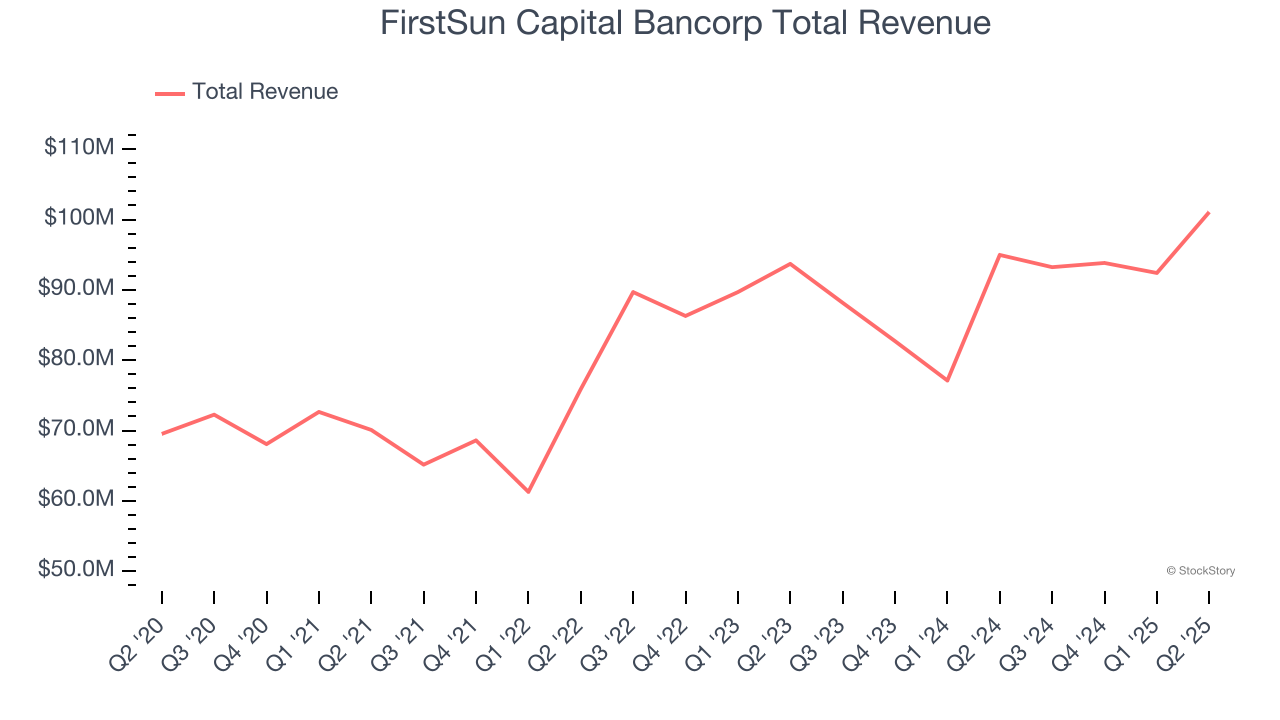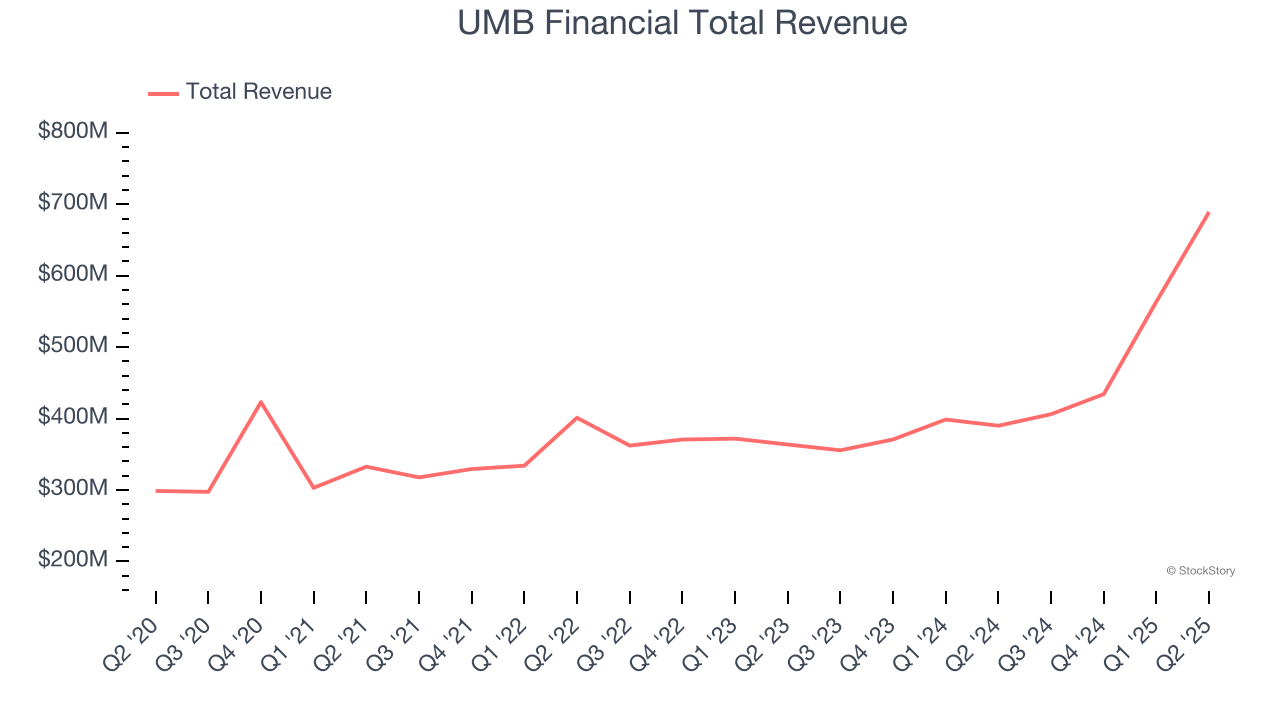
As the Q2 earnings season comes to a close, it’s time to take stock of this quarter’s best and worst performers in the regional banks industry, including FirstSun Capital Bancorp (NASDAQ:FSUN) and its peers.
Regional banks, financial institutions operating within specific geographic areas, serve as intermediaries between local depositors and borrowers. They benefit from rising interest rates that improve net interest margins (the difference between loan yields and deposit costs), digital transformation reducing operational expenses, and local economic growth driving loan demand. However, these banks face headwinds from fintech competition, deposit outflows to higher-yielding alternatives, credit deterioration (increasing loan defaults) during economic slowdowns, and regulatory compliance costs. Recent concerns about regional bank stability following high-profile failures and significant commercial real estate exposure present additional challenges.
The 99 regional banks stocks we track reported a satisfactory Q2. As a group, revenues were in line with analysts’ consensus estimates.
Thankfully, share prices of the companies have been resilient as they are up 5.1% on average since the latest earnings results.
FirstSun Capital Bancorp (NASDAQ:FSUN)
Tracing its roots back to 1892 when it first opened its doors in Kansas, FirstSun Capital Bancorp (NASDAQ:FSUN) operates Sunflower Bank, providing commercial and consumer banking services to businesses and individuals across the Southwest region.
FirstSun Capital Bancorp reported revenues of $101.1 million, up 6.4% year on year. This print fell short of analysts’ expectations by 2.2%. Overall, it was a slower quarter for the company with net interest income and tangible book value per share in line with analysts’ estimates.
Neal Arnold, FirstSun’s Chief Executive Officer and President, commented, “Our strong results this quarter continue to demonstrate the success of our relationship-focused business model, a well-diversified business mix, and the execution of our core strategic initiatives. Performance this quarter was highlighted by exceptional deposit growth, a stable net interest margin, an increase in service fees to revenue mix to 25.6% and 12.0% earnings per share growth. While we saw higher credit costs this quarter amidst the challenging banking environment, the hard work and focus of all our teams across the organization is recognized in our results. We continue to diligently focus on credit administration and responsibly growing the business by delivering the best solutions to all our customers throughout our high growth southwestern and western market footprint.”

Unsurprisingly, the stock is down 1.6% since reporting and currently trades at $38.64.
Is now the time to buy FirstSun Capital Bancorp? Access our full analysis of the earnings results here, it’s free.
Best Q2: UMB Financial (NASDAQ:UMBF)
With roots dating back to 1913 and a name derived from "United Missouri Bank," UMB Financial (NASDAQ:UMBF) is a financial holding company that provides banking, asset management, and fund services to commercial, institutional, and individual customers.
UMB Financial reported revenues of $689.2 million, up 76.7% year on year, outperforming analysts’ expectations by 8.6%. The business had a stunning quarter with a beat of analysts’ EPS estimates and an impressive beat of analysts’ tangible book value per share estimates.

The market seems happy with the results as the stock is up 14.5% since reporting. It currently trades at $125.61.
Is now the time to buy UMB Financial? Access our full analysis of the earnings results here, it’s free.
Weakest Q2: Coastal Financial (NASDAQ:CCB)
Pioneering the intersection of traditional banking and financial technology in the Pacific Northwest, Coastal Financial (NASDAQ:CCB) operates as a bank holding company that provides traditional banking services and Banking-as-a-Service (BaaS) solutions to consumers and businesses.
Coastal Financial reported revenues of $119.4 million, down 11.7% year on year, falling short of analysts’ expectations by 21.5%. It was a disappointing quarter as it posted a significant miss of analysts’ net interest income estimates and a significant miss of analysts’ EPS estimates.
Interestingly, the stock is up 14.2% since the results and currently trades at $115.88.
Read our full analysis of Coastal Financial’s results here.
Axos Financial (NYSE:AX)
Originally founded as Bank of Internet USA in 1999 before rebranding in 2018, Axos Financial (NYSE:AX) is a diversified financial services company that provides digital banking, securities clearing, and investment advisory solutions to retail and business customers nationwide.
Axos Financial reported revenues of $321.4 million, up 10.5% year on year. This result topped analysts’ expectations by 3.4%. Overall, it was a strong quarter as it also logged a beat of analysts’ EPS estimates and tangible book value per share in line with analysts’ estimates.
The stock is up 8% since reporting and currently trades at $92.14.
Read our full, actionable report on Axos Financial here, it’s free.
WesBanco (NASDAQ:WSBC)
Tracing its roots back to 1870 in West Virginia, WesBanco (NASDAQ:WSBC) is a bank holding company that provides retail and commercial banking, trust services, insurance, and investment products through its subsidiaries across several Midwestern and Mid-Atlantic states.
WesBanco reported revenues of $260.7 million, up 76.2% year on year. This number surpassed analysts’ expectations by 1.6%. Zooming out, it was a satisfactory quarter as it also recorded a narrow beat of analysts’ net interest income estimates but a slight miss of analysts’ tangible book value per share estimates.
The stock is up 3.5% since reporting and currently trades at $32.99.
Read our full, actionable report on WesBanco here, it’s free.
Market Update
As a result of the Fed’s rate hikes in 2022 and 2023, inflation has come down from frothy levels post-pandemic. The general rise in the price of goods and services is trending towards the Fed’s 2% goal as of late, which is good news. The higher rates that fought inflation also didn't slow economic activity enough to catalyze a recession. So far, soft landing. This, combined with recent rate cuts (half a percent in September 2024 and a quarter percent in November 2024) have led to strong stock market performance in 2024. The icing on the cake for 2024 returns was Donald Trump’s victory in the U.S. Presidential Election in early November, sending major indices to all-time highs in the week following the election. Still, debates around the health of the economy and the impact of potential tariffs and corporate tax cuts remain, leaving much uncertainty around 2025.
Want to invest in winners with rock-solid fundamentals? Check out our Top 6 Stocks and add them to your watchlist. These companies are poised for growth regardless of the political or macroeconomic climate.
StockStory is growing and hiring equity analyst and marketing roles. Are you a 0 to 1 builder passionate about the markets and AI? See the open roles here.
